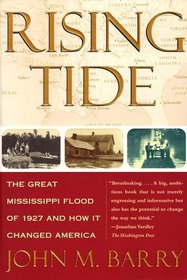Helpful Score: 4
For history buffs, this fascinating look at the Great Missippi Flood of 1927 uncovers not only the bad science that led to massive flooding after heavy rains, but the underlying social tensions of the time (racism, politics, high society, etc.) that contributed the severity of the disaster. It's incredible how little Americans know of the history of our country, but this book provides readable insight to the issues of the early 20th-century South. Always interesting, sometimes infuriating, this book will make a history buff out of just about anyone.
Amy D. (Iowan) reviewed Rising Tide: The Great Mississippi Flood of 1927 and How It Changed America on + 173 more book reviews
Helpful Score: 1
The premise of this book is to tell the story of the 1927 flood and some of the dramatic impacts it had on America. Sadly, the author casts his net so wide that the amount of information is overwhelming and players that could have had "bit" parts in this retelling are given more than their fair share. There is a lot of interesting detail and history here that most will have not heard before.




![header=[] body=[Get a free book credit right now by joining the club and listing 5 books you have and are willing to share with other members!] Help icon](/images/question.gif?v=29befa08)
